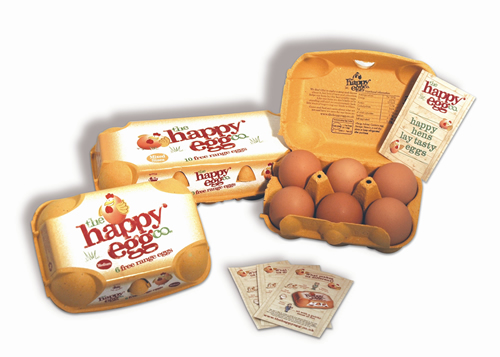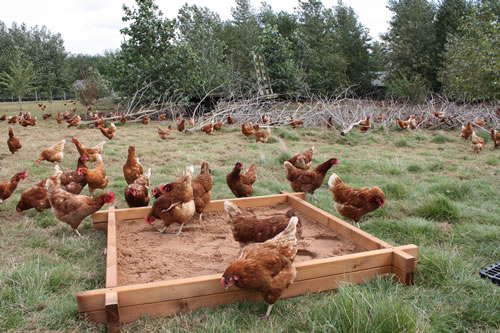
More details have now been disclosed about Noble’s new national free range egg brand, including information about how producers will be selected for the brand and what those producers will be expected to do to meet the requirements laid down by the packing company.
The brand is being marketed under the name the happy egg co and has been launched with a PR campaign that seeks to sell consumers the benefits of high standards of animal welfare. "From specially selected farms where happy hens lay tasty eggs," is the pitch to customers.
Noble is expected to spend up to £2 million on television advertising this spring to establish the new brand. Noble chief executive Peter Thornton hopes that the happy egg co will do for eggs what Cathedral City has done for dairy.
Noble has already said that the eggs will be stocked by supermarket chains, including Asda, Sainsbury’s, Tesco, Co-op and Morrisons. They will be priced at £1.58 for six medium eggs and £1.78 for six large eggs.

The packing company has now explained to the Ranger what the launch of the new brand will mean for producers and what will be expected of them.
A spokesman for Noble said that producers taking part in the new scheme had been selected by the company. All those producers were from the company’s gold and platinum farm groups and each farm selected had range enrichment such as trees. The selection had taken place during the company’s annual assessment process. In all, 88 flocks throughout England and Scotland had been chosen to produce eggs for the happy egg co. Of those flocks, 69 were due to be producing by the end of January just gone.
The Ranger asked Noble about the prices that would be paid to producers. According to Noble’s reply, it would seem that the happy egg co producers will continue to be paid at their current premium. "As mentioned, the farms are selected from our gold and platinum farms, each of which has range enrichment, and they receive a premium for having this," was the statement issued to us by Noble. The packing company will be paying for range enrichment equipment required to be placed on farms involved in the scheme.
Range enrichment is the key element in what Noble hopes will set the happy egg co apart from other free range eggs. We spoke to Jean-Paul Michalski, who manages one of Noble’s own farms just outside Tring in Hertfordshire. He said, "Most producers will already be doing what is required inside the units. The difference is in the enrichment of outside areas. This involves doing something a bit different and giving it a quirky angle. We are encouraging the chickens to go outside and demonstrate their natural behaviour. If we can encourage better usage of the range there will be benefits in lots of ways," he said.
Noble has provided the Ranger with the printed farm specification for the happy egg co scheme. That specification requires a producer to be on a Noble gold or platinum graded free range farm with trees planted for range enrichment. The range must have field shelters and swings, as well as sand pits. Swings must also be provided on the litter area inside the house. Noble also specifies a minimum of 10 string ’spiders’ per colony. The company asks for brashings on the range area. These should be provided by thinnings from a tree management programme. The printed specification goes on to read, "Plenty of TLC! This is probably the most important factor. We know that our top graded farms also get the best results from their flocks. It is not a coincidence that flocks which receive that extra bit of care and attention, ensuring that the hens’ routine is not disturbed in any way, are rewarded by having a less stressful and more productive flock."
Noble says in the specification that flocks with a shell quality or shell colour problem may have to be excluded. Producers involved in the happy egg co scheme will experience an increased number of visits from Noble’s field service team - quarterly visits will be a minimum.
"Our farms are regularly policed by the field team. However, as a new brand we will increase these visits, proactively supporting the producers, giving them advice and assistance in whatever way necessary to ensure the smooth and efficient running of the farms," said a spokesman for the company.
Noble says that producers have been supportive of the new initiative. "The majority are extremely keen to be involved. Being a happy egg co producer means that they are playing a significant role in raising the profile of free range eggs," said the spokesman.
Jean-Paul Michalski said that creating a brand that stood for good quality and was instantly recognisable could only be good for the industry. "There is a lot of confusion amongst consumers about the different types of systems. We are really trying to develop a brand association with the British egg industry rather than just Sainsbury’s or Tesco eggs," he said.
"The brand promotes bird welfare in a way that is understandable to the consumer. As producers we know the benefits of birds ranging well. We are encouraging them to range more by providing things like range shelters and brashings. We have seen a lot more use of the range where we have had brashings and range shelters," he said.
Noble chief executive Peter Thornton has said that development of the new brand would take time. He told members of a free range discussion group just before Christmas that the company intended to spend between £1 million and £2 million on television advertising during March and April, but he said it would not pay back immediately. Developing a brand could take three years.
Speaking to producers at the BFREPA conference in November, he said, "In the next two to three years I hope we can cement a premium in the category and start to distribute value better around the supply chain."
He said free range eggs were in danger of becoming every bit as much of a commodity as cage eggs. There was a danger that they could lose their value added position and the industry needed to find ways of retaining and building value. He said Noble was in the best position to do that.
